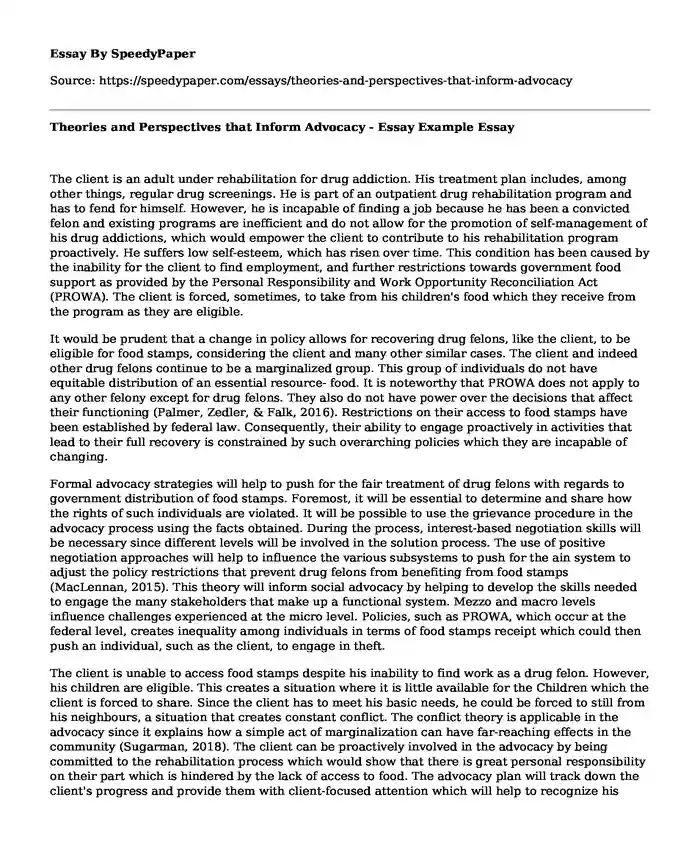
| Type of paper: | Course work |
| Categories: | Public policy Healthcare policy Conflict resolution Drug abuse |
| Pages: | 3 |
| Wordcount: | 678 words |
The client is an adult under rehabilitation for drug addiction. His treatment plan includes, among other things, regular drug screenings. He is part of an outpatient drug rehabilitation program and has to fend for himself. However, he is incapable of finding a job because he has been a convicted felon and existing programs are inefficient and do not allow for the promotion of self-management of his drug addictions, which would empower the client to contribute to his rehabilitation program proactively. He suffers low self-esteem, which has risen over time. This condition has been caused by the inability for the client to find employment, and further restrictions towards government food support as provided by the Personal Responsibility and Work Opportunity Reconciliation Act (PROWA). The client is forced, sometimes, to take from his children's food which they receive from the program as they are eligible.
It would be prudent that a change in policy allows for recovering drug felons, like the client, to be eligible for food stamps, considering the client and many other similar cases. The client and indeed other drug felons continue to be a marginalized group. This group of individuals do not have equitable distribution of an essential resource- food. It is noteworthy that PROWA does not apply to any other felony except for drug felons. They also do not have power over the decisions that affect their functioning (Palmer, Zedler, & Falk, 2016). Restrictions on their access to food stamps have been established by federal law. Consequently, their ability to engage proactively in activities that lead to their full recovery is constrained by such overarching policies which they are incapable of changing.
Formal advocacy strategies will help to push for the fair treatment of drug felons with regards to government distribution of food stamps. Foremost, it will be essential to determine and share how the rights of such individuals are violated. It will be possible to use the grievance procedure in the advocacy process using the facts obtained. During the process, interest-based negotiation skills will be necessary since different levels will be involved in the solution process. The use of positive negotiation approaches will help to influence the various subsystems to push for the ain system to adjust the policy restrictions that prevent drug felons from benefiting from food stamps (MacLennan, 2015). This theory will inform social advocacy by helping to develop the skills needed to engage the many stakeholders that make up a functional system. Mezzo and macro levels influence challenges experienced at the micro level. Policies, such as PROWA, which occur at the federal level, creates inequality among individuals in terms of food stamps receipt which could then push an individual, such as the client, to engage in theft.
The client is unable to access food stamps despite his inability to find work as a drug felon. However, his children are eligible. This creates a situation where it is little available for the Children which the client is forced to share. Since the client has to meet his basic needs, he could be forced to still from his neighbours, a situation that creates constant conflict. The conflict theory is applicable in the advocacy since it explains how a simple act of marginalization can have far-reaching effects in the community (Sugarman, 2018). The client can be proactively involved in the advocacy by being committed to the rehabilitation process which would show that there is great personal responsibility on their part which is hindered by the lack of access to food. The advocacy plan will track down the client's progress and provide them with client-focused attention which will help to recognize his strengths.
References
Palmer, M. A., Zedler, J. B., & Falk, D. A. (2016). Ecological theory and restoration ecology. In Foundations of restoration ecology (pp. 3-26). Island Press, Washington, DC.
Sugarman, A. (2018). Conflict Theory, Nonlinear Development, and Mutative Action with Cases of Cumulative Trauma: Commentary on Fischer. Journal of the American Psychoanalytic Association, 66(1), 103-114.
MacLennan, D. (2015, May). Human Agency and Learning. In Proceedings of the 7th International Conference on Computer Supported Education-Volume 1 (pp. 452-456). SCITEPRESS-Science and Technology Publications, Lda.
Cite this page
Theories and Perspectives that Inform Advocacy - Essay Example. (2023, Jan 03). Retrieved from https://speedypaper.net/essays/theories-and-perspectives-that-inform-advocacy
Request Removal
If you are the original author of this essay and no longer wish to have it published on the SpeedyPaper website, please click below to request its removal:
- America's Transition into a Super Power - Free Essay in American History
- Essay Sample on eCommerce In Asia and Europe
- Strategic Management Research - Essay Example
- Political Science Essay: Current Events and U.S Diplomacy
- Poem Analysis Essay Example: They Say Plant Do Not Speak by Rosalia de Castro
- Essay Sample on the Nature of the Human Race
- Dialogue on the Problem of Evil - Paper Example
Popular categories




